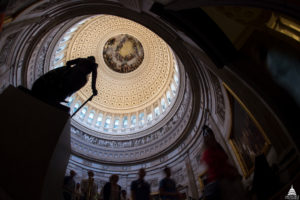Darwin Day Resolutions Show Some Government Officials Still Care about Science
 The US Capitol Rotunda (photo by Architect of the Capitol)
The US Capitol Rotunda (photo by Architect of the Capitol) Congress isn’t exactly known for having the best track record when it comes to science and technology. From the embarrassing hearings on Capitol Hill in December focused on tech issues (which showed how very little some members of Congress know about modern technology) to a certain conservative senator attempting to disprove climate change by bringing a snowball to the floor of the Senate, the United States Congress has left much to be desired when it comes to scientific advocacy.
That’s why I was so honored to work again with Rep. Jim Himes (D-CT) and Sen. Richard Blumenthal (D-CT) to reintroduce the Darwin Day resolutions this week. For those who don’t know, Darwin Day is an international celebration of science and humanity held annually on or near February 12, the date on which Charles Darwin was born in 1809. The observance celebrates the discoveries and life of Darwin and expresses gratitude for the enormous benefits that scientific knowledge has contributed to the advancement of humanity.
The resolutions, H. Res. 123 and S. Res. 63, have been introduced in the US House of Representatives and the US Senate for the seventh time since 2011, due to the hard work of the lobbying team at the American Humanist Association. The resolutions:
- State that evolution “provides humanity with a logical and intellectually compelling explanation for the diversity of life on Earth;”
- Demand that the “advancement of science be protected from those unconcerned with the adverse impacts of global warming and climate change;” and
- Confirm that the “teaching of creationism in some public schools compromises the scientific and academic integrity of the United States’ education systems.”
These resolutions are important signs that some members of Congress still approach public policy from a rational mindset and support both scientific research and scientific education in our public schools. House Resolution 123 is currently cosponsored by Representatives Eleanor Holmes Norton (D-DC), Mike Quigley (D-IL), Alan Lowenthal (D-CA), Jared Huffman (D-CA), Donald McEachin (D-VA), Adam Schiff (D-CA), Al Lawson Jr. (D-FL), Jan Schakowsky (D-IL), Jerry McNerney (D-CA), Steve Cohen (D-TN), Mark Pocan (D-WI), Bill Foster (D-IL), Jaime Raskin (D-MD), Derek Kilmer (D-WA), Thomas Suozzi (D-NY), Dina Titus (D-NV), and Zoe Lofgren (D-CA). Senate Resolution 63 is currently cosponsored by Senators Chris Murphy (D-CT) and Sheldon Whitehouse (D-RI).
“Charles Darwin represents the power of science and reason to change our world and the way we view our place in the universe,” said Rep. Himes. “Overcoming the challenges we face—the destruction of our environment, the need for renewable energy, and global population growth—will require the best humanity has to offer. We must inspire a new generation of Americans to enter the fields of science, technology, math, and engineering. There is no nobler pursuit than acquiring an education in order to better the lot of humanity. There is no nobler title one can wear than ‘scientist.’”
“I am proud to champion and celebrate Charles Darwin and the countless scientists and explorers who’ve built on his remarkable discoveries and achievements,” said Sen. Blumenthal. “Darwin Day recognizes Darwin’s invaluable contributions, which fundamentally changed the field of natural science and dramatically advanced our understanding of the world. Today, we reflect and remember that the dogged pursuit of science and human knowledge are profoundly important to the progress of humankind and the preservation of our planet.”
Hopefully, these important resolutions will be merely the first step in a congressional pivot to take scientific research more seriously and to remove religious belief and personal biases from conversations about scientific findings. Regardless, it’s good to see that Darwin is getting the credit and respect he’s due.
